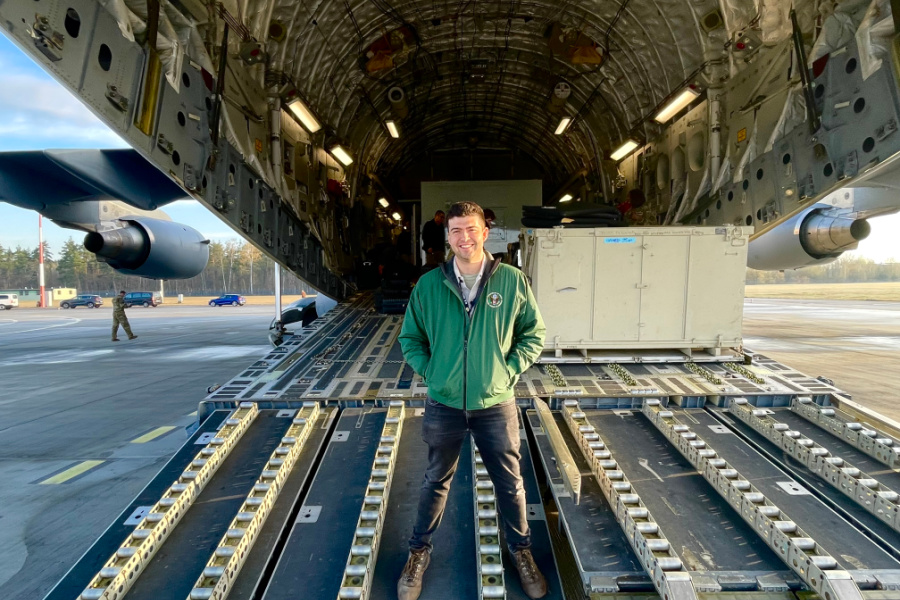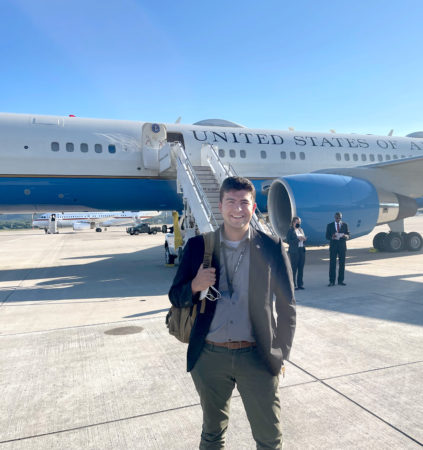
When Antonio De Loera-Brust ’17 was a film major and Chicana/o and Latina/o studies minor at Loyola Marymount University, he aspired to be the Mexican American equivalent of Steven Spielberg. Five years after graduation, however, De Loera-Brust has found himself working in Washington D.C. rather than in Hollywood. Currently serving as special assistant to U.S. Secretary of State Antony Blinken, De Loera-Brust is playing a role in shaping American diplomacy and foreign policy.
“Our job in the State Department is to stop wars, resolve conflicts, and uphold international peace and order,” said De Loera-Brust. “This is diplomacy at the highest level, and it is very exciting to be a part of.”
Since landing the job in 2021, De Loera-Brust has been involved in some of the world’s most difficult and complicated crises including the evacuation of Kabul and the withdrawal of United States troops from Afghanistan, and now the Russian invasion of Ukraine and an impending global food crisis.

He has traveled all over the world with the Secretary from Qatar to Latvia to Australia, but it was a trip to Mexico City that was particularly meaningful for De Loera-Brust. Even though he was there on official business, he carved an hour out of his incredibly packed schedule to visit his grandmother.
“My grandma saw her son (my dad) leave Mexico in the 80’s to pursue a better life in the U.S.,” De Loera-Brust said. “Years later, she was able to see her grandson return as special assistant to the United States Secretary of State. It was a surreal and special moment for both of us.”
De Loera-Brust’s interest in film, and now local and international politics, stems from his Mexican American roots. Coming of age in Yolo County, California, an agricultural community that hosts thousands of seasonal agricultural workers and their families every year, has shaped his identity and his drive to help address challenges faced by our most marginalized communities.
“I try to approach politics with the Jesuit mindset of going to the margins and starting with those who are most in need,” said De Loera-Brust. “They are not necessarily the people who are going to decide primaries; they’re not your most powerful campaign donors, or your most influential swing voters.” But for De Loera-Brust, politics is not about the pursuit of narrow self-interest. It is about advancing the common good all while trying to keep his core values and career in alignment.
It was at LMU where De Loera-Brust laid the foundation for a career in public service. As a member of MEChA and leader of De Colores, De Loera-Brust sought out opportunities to connect with, support, and tell the stories of disadvantaged and marginalized populations. He led several service-immersion trips across the Mexico border, and made a documentary for his senior thesis revealing the complexity of life for deportees in Tijuana, Mexico. These co-curricular and academic experiences introduced him to creative activism and using his education and talents as a force for social change.
After graduating from LMU, he served as an O’Hare Fellow for America: The Jesuit Review. “I enjoyed telling compelling stories and increasing public awareness of important issues,” De Loera-Brust said. “Ultimately, I decided I wanted to be less of a chronicler and more of a participant.”
In 2018, he was awarded a public policy fellowship for the Congressional Hispanic Caucus Institute, which led to a full-time position with Congressman Joaquin Castro of Texas. De Loera-Brust then went on to work for the presidential campaign of former HUD Secretary Julián Castro, Joaquin Castro’s brother, and later Sen. Elizabeth Warren’s presidential campaign. Campaign work and writing policy plans with Castro and Warren were highly formative experiences. “Obviously, we didn’t win, but I learned that campaigns can still be vehicles for introducing and advancing ideas on important issues like foster care, immigration, and farmworkers’ basic needs; even if the campaign fails,” he said.
The end of the Warren campaign coincided with the beginning of the pandemic. De Loera-Brust returned to Yolo County where he got a job in local government as a Latino outreach specialist. In this role, he advocated for farmworkers to be prioritized for the vaccine. “The best way to fight disinformation, on vaccines or anything else, is to build institutions that the community trusts. You can only do that by delivering real results. I hope that effort will continue long after the virus is gone.”
Beyond helping to build trust and vaccinate the community, he also contributed to the efforts of local community organizations to provide rent assistance and other social safety nets for undocumented essential workers and families who were excluded from federal aid and stimulus checks. “The pandemic exacerbated inequalities, but was also an incubator for solidarity and innovation at the local level,” said De Loera-Brust.
Reflecting on his academic and political career thus far, De Loera-Brust said that storytelling has been the thread that ties it all together.
“In film, journalism, and politics you are trying to tell a narrative and who you are telling stories about is saying who matters in society,” De Loera-Brust said. “Our marginalized communities matter and representation in everything from film to politics is vital.” Would he ever return to Hollywood? “Maybe someday…but I’ll settle for getting to take on Vladimir Putin for now!”



